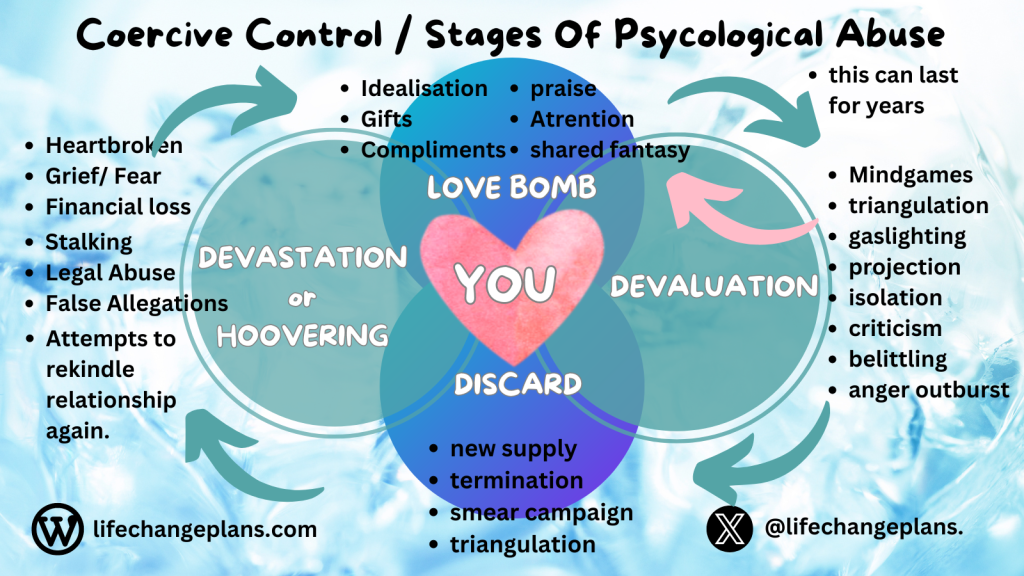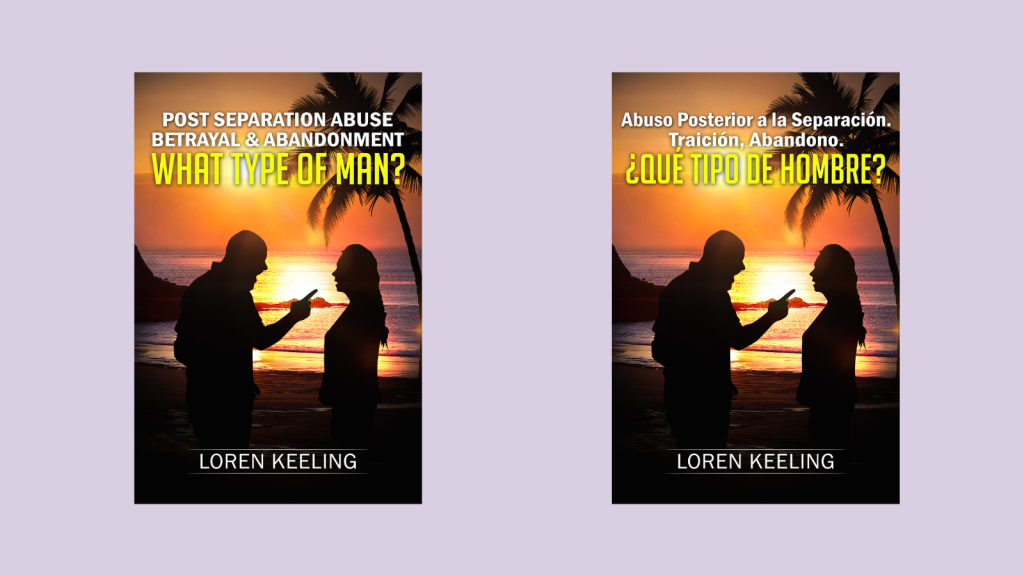They Can’t Control You Anymore
Leaving an emotionally abusive narcissistic partner is a courageous step towards reclaiming your life and well-being. On the other hand, if your relationship has ended abruptly with no prior warning, known as a narcissistic discard then you are likely to be in significant shock, grief, trauma and anxiety. However, for many of us, the abuse doesn’t end when the relationship ends. It is a known fact that separation is the most dangerous time for a survivor of abuse.
We might have never considered the relationship to be abusive because of our societal belief that says, “Well he didn’t hit me”. Post-separation Narcissistic abuse can be insidious and covert, often manifesting as emotional manipulation, psychological abuse, financial abuse, and legal abuse. The impact on women in mid or later life, whether married or in non-married situations, can be devastating. Understanding these post-separation abuse tactics and knowing how to combat them is crucial for your recovery and empowerment.
Understanding Post-Separation Abuse
Emotional and Psychological Abuse:
Narcissists thrive on power control and manipulation. After separation, the abuse may escalate as they try to destabilise you emotionally and psychologically. Some of the tactics include gaslighting, smear campaigns, and relentless harassment through messages emails constant phone calls or stalking you on social media. You may still need to share the home and this becomes even more emotionally traumatic.
Financial Abuse:
What Is Financial Abuse? Emotional impacts include, victims feeling trapped, humiliated, and powerless. This stress can lead to anxiety, depression, and other mental health challenges. In separation, normally both parties expect that there will be a fair and equitable settlement so that each person can be as financially secure as finances will allow.
However, Narcissists may attempt to ruin you financially by withholding money, if they have been in control of paying for everything and you have been wholly dependent on their income you are in a precarious and vulnerable position. They may have sabotaged your financial independence, coercing you into spending your savings, buying luxuries or taking expensive holidays depleting your retirement funds. In divorce situations, a narcissist can drag out legal battles to deplete your resources. What are the psychological effects of financial abuse? This manipulation, primarily rooted in control over another’s economic resources, can have far-reaching consequences for victims. Leaving survivors emotionally, psychologically and financially devastated.
Legal Abuse:
In order to maintain control, your former spouse might threaten or intimidate you with verbal aggression or humiliation warning you that you will have nothing without them, putting you in a place of fear. They may try to coerce you into relinquishing a chunk of your financial settlement. It is not uncommon for narcissists to hide finances and savings to avoid paying out the full entitlement.
Narcissists often use the legal system against you. They may file frivolous lawsuits, demand excessive mediation sessions, or refuse to comply with court orders, prolonging the stress and financial burden. In some cases, women who seek legal advice discover the extent of the abusive relationship they have been in, this can happen when a spouse or partner abandons the home and disappears with another younger model or an old flame from the past for example. You might even be advised to file a complaint of coercive controlling behaviour if you are a resident of the UK. In Spain where I’m living this form of abusive behaviour falls under emotional and psychological abuse as a form of gender-based violence.
Impact on Older Women
For older women, the effects of post-separation abuse can be particularly devastating. They may face age-related challenges such as health issues, limited career opportunities, and a smaller support network. Older women are less likely to have worked full-time in their jobs or careers so their pension entitlements will be much lower than their husband or partner, this can mean a huge worry or fear of poverty in retirement.
Whether married or in a non-married relationship, the societal and legal systems can sometimes fail to provide adequate protection and support. Although the UK has now included financial and economic abuse as part of the crime of coercive controlling behaviours in domestic abuse situations, the professionals involved are usually slow to catch up. One helpful organisation that has campaigned for the changes in the law is Surviving Economic Abuse SEA, so if you think you are in a situation of post-separation financial abuse it might be a good idea to educate yourself first before seeking legal advice in order to understand your rights.
Solutions for Women in Mid or later Life
1. Build a Strong Support Network:
Surround yourself with trusted friends, family, and support groups who understand your situation and can offer emotional and practical assistance. If this is difficult because you have experienced isolation, try and reach out to online communities and find local support groups for survivors of narcissistic abuse. These networks can be invaluable. Many groups on Social Media provide private platforms for discussing situations and gaining knowledge that can help you.
2. Document Everything:
Keep detailed records of all interactions with your ex-partner, including emails, texts, and any incidents of harassment or threats. Record the date and the time, what happened, where you were, and how you felt. This documentation can be crucial in legal proceedings and in demonstrating the pattern of abuse.
Never try to negotiate anything on your own. A Narcissist can agree to a settlement and then at the last minute change things and move the goalposts. This is part of their manipulation tactics, if you know this in advance you will be prepared. Under the domestic abuse laws mediation is inappropriate. During mediation, it is assumed that both parties have equal bargaining power and an equal voice in decision-making. This is not the case in relationships that involve an emotionally abusive narcissistic partner. Negotiations or ADR alternative dispute resolution should only be done between two legal professionals and as a survivor of abuse, your legal professional should be knowledgeable in domestic abuse and especially the manipulative tactics of a narcissist.
3. Secure Your Finances:
It is imperative to understand your rights. Take steps to protect your financial independence. This may include opening separate bank accounts, securing your credit, and working with a financial advisor who understands the complexities of post-separation financial abuse. Married women do have some financial protection under family laws even when their name does not appear on the deeds of the property, and they did not contribute financially. Unfortunately, in many countries, this legal protection does not extend to our non-married sisters. This means that a narcissistic emotionally abusive partner could take advantage of this legal loophole and leave his ex-partner in a precarious financially vulnerable position at the point of separation or relationship breakdown.
4. Seek Legal Support:
Find a lawyer experienced in dealing with narcissistic abuse cases. Try searching for Solicitors in the UK who specialise in Coercive Control, and contact several companies.
They can help you navigate the legal system, advocate for your rights, and counteract legal abuse tactics. Legal aid services or pro bono lawyers can be a resource if financial constraints are a concern. I have also included a few resources at the end of this article.
5. Prioritize Self-Care and Mental Health:
Engage in activities that promote your well-being and mental health. This can include therapy with a professional specializing in trauma and narcissistic abuse, mindfulness practices, and regular physical exercise. If finances do not stretch to professional help try some other methods, relaxing baths, taking walks in nature, or listening to music you enjoy. Try out some affirmations, I did this when I was experiencing grief and fear. Try listening to some of the educational videos on YouTube that cover post-separation narcissistic abuse. The more understanding and knowledge you gain the less you will be gripped by fear.
6. Educate Yourself:
Knowledge is power. Learn about narcissistic behaviour and post-separation abuse tactics. Understanding these patterns of narcissistic abuse can help you anticipate their actions and respond effectively. I self-published my story to raise awareness of the hidden forms of abuse. I also cover the gaps in the laws and warn on how couples in cohabiting relationships need to consider creating a legal contract to protect them if anything should happen.
Find Out More Here ★☆★ 6 Common Post Separation Abuse Tactics. ★☆★
Post-Separation Narcissistic Abuse – Cycle Of Abuse

7. Set Firm Boundaries:
Establish and maintain clear boundaries with your ex-partner. This may involve limiting or cutting off direct communication. The best way to do this is to go “No Contact”. If you have children together then another method is known as “Grey Rock”. This involves becoming as uninteresting and unengaged as possible so that the other person loses interest. Some people anecdotally report that it reduces conflict and abuse. Where necessary use intermediaries or legal channels for all other interactions.
8. Advocate for Change:
Join or support organisations advocating for legal reforms and better protections for survivors of domestic abuse. Your voice can help bring about changes that benefit others in similar situations. Women in mid or later life are often more vulnerable many support services are geared up to help younger women with children so it is important to make your voice heard so that more people understand these issues.
Conclusion
Surviving post-separation abuse by a narcissist is a challenging journey, but you are not alone. By building a strong support network, protecting your finances, seeking legal aid, and prioritizing your mental health, you can reclaim your life and move forward with strength and a positive mindset. Remember, each baby step you take towards healing is a victory, and you deserve a future free from abuse and filled with happiness financial security and peace.
Resources:
– National Domestic Violence Hotline: 1-800-799-7233 https://www.thehotline.org/
(Office for Victims of Crime, Office of Justice Programs, U.S.)
– Women’s Aid: www.womensaid.org.uk
– Financial Abuse Resources: www.thehotline.org/resources/financial-abuse/
– Legal Aid Services: www.lsc.gov/what-legal-aid
– Surviving Economic Abuse Help https://survivingeconomicabuse.org/i-need-help/
– The Spanish National Gender Violence Helpline (016) offers multilingual support 24 hours a day and is free of charge
-Government Office Against Gender-Based Violence https://violenciagenero.igualdad.gob.es/en/home.htm
Stay strong and empowered. Your journey to a brighter future starts now.
Post-Separation Narcissistic Abuse – What Type Of Man?




